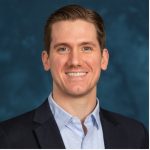Armour College of Engineering’s Department of Mechanical, Materials, and Aerospace Engineering will welcome Dr. Daniel Bruder, a postdoctoral researcher in the Microrobotics Laboratory at Harvard University, to present a lecture, “Towards Highly Capable Soft Robots.” online, Wednesday, February 2, 2022, from 3:30–4:30 p.m. Contact Elena Magnus at magnus@iit.edu for the seminar details and a link to join.
Abstract
Soft robots have been an active area of research in the robotics community due to their versatility and ability to safely interact with their environment. However, despite their potential advantages, their real-world applications have been limited due to the difficulty involved in modeling and controlling soft robotic systems. In this talk, I’ll describe two modeling approaches aimed at overcoming the limitations of previous methods. The first is a physics-based approach for fluid-driven actuators that offers predictions in terms of tunable geometrical parameters, making it a valuable tool in the design of soft fluid-driven robotic systems. The second is a data-driven approach that leverages Koopman operator theory to construct models that are linear, which enables the utilization of linear control techniques for nonlinear dynamical systems like soft robots. Using this Koopman-based approach, a pneumatically actuated soft arm was able to autonomously perform manipulation tasks such as trajectory following and pick-and-place with a variable payload without undergoing any task-specific training. In the future, these approaches could offer a paradigm for designing and controlling all soft robotic systems, leading to their more widespread adoption in real-world applications.
Biography
 Daniel Bruder received a B.S. degree in engineering sciences from Harvard University in 2013, and a Ph.D. degree in mechanical engineering from the University of Michigan in 2020. He is currently a postdoctoral researcher in the Harvard Microrobotics Lab. He is a recipient of the NSF Graduate Research Fellowship and the Richard and Eleanor Towner Prize for Outstanding Ph.D. Research. His research interests include the design, modeling, and control of robotic systems, especially soft robots.
Daniel Bruder received a B.S. degree in engineering sciences from Harvard University in 2013, and a Ph.D. degree in mechanical engineering from the University of Michigan in 2020. He is currently a postdoctoral researcher in the Harvard Microrobotics Lab. He is a recipient of the NSF Graduate Research Fellowship and the Richard and Eleanor Towner Prize for Outstanding Ph.D. Research. His research interests include the design, modeling, and control of robotic systems, especially soft robots.
